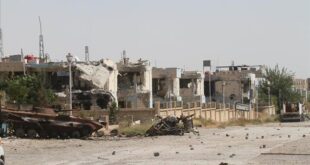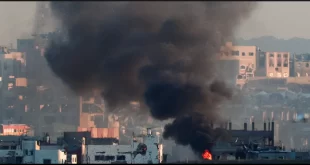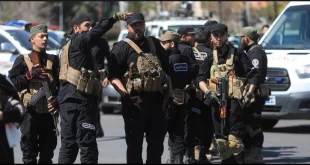Homs, Syria – In an emotional day, mixed with sadness for the loss of life and a celebration of victory, the people of Homs, Syria came out to vote in their presidential election, June 3. Outside many polling places, hundreds of people gathered to rally, chant and dance dabke, the traditional dance of Syria, Lebanon and Palestine. The celebratory mood was because in the past month, the armies backed by the U.S., NATO, Israel and the Gulf states that had been fighting in the Old City of Homs were finally driven out.
There were three candidates on the ballot: Maher Abd Al-Hafiz Hajjar, Hassan Abdullah al-Nouri and Bashar al-Assad, but in Homs, there was no doubt that President Bashar al Assad was going to win the election. When our delegation of election observers from the U.S., Ireland, Canada, India and Malaysia asked voters their presidential candidate, over and again they said, “Bashar al Assad.” The explanation was the same as well: because he has led the country to defeat the dreaded and murderous foreign-led armies.
As had happened in Beirut over the weekend, the numbers of those wanting to vote overwhelmed the polling places. The same thing happened in the 9601 precincts around the country. Scheduled to close at 7:00 p.m., the polls had to stay open until midnight to accommodate all those standing in line.
900 faces of martyrs on a wall
The horror of what the community here has faced over the past three years was driven home at every turn. On the wall on a main street, there were photos of 900 of the people who had died at the hands of the foreign-backed armies. Many of the photos showed men in uniform. This didn’t come as a surprise to our delegation. The previous day, Speaker of the People’s Assembly Dr. Jihad Al Lahham had told our delegation that 80,000 of the 160,000 dead in the war are members of the Syrian Arab Army (SAA), or the National Defense Force (NDF). The second largest number of deaths, according to the pro-rebel Syrian Observatory for Human Rights, are civilians. The smallest numbers are the rebels themselves. Over the past year, the percent of foreign rebel casualties has grown. By April, it was one out of every three of their 35,000 deaths.
A regional parliamentarian in Homs said, “The NDF is modeled after the National Liberation Front in Vietnam.” He explained that the NDF was formed out of need to deal with the suddenness and ferocity of the armed assaults on the country when they begin in 2011. “During the day I wear a suit and tie for work, but in my house, I have a Kalashnikov rifle for when the takfiri attack my neighborhood.” Takfiri is the word for the Muslim extremists that are the main force among the right wing rebels.
We also spoke with the sister of a man killed by the rebels, and her moving account had everyone at the polling place in tears. Several soldiers came to vote limping or on crutches.
The Old City
At the end of five hours of visiting multiple precincts, meetings with priests in Syrian Catholic and Orthodox churches and multiple high energy rallies, we were taken on a trip to a polling place in the Old City of Homs. We drove through several miles of the Old City to get there, through block after block of ancient buildings pockmarked by bullet holes and the collapsing ruins of those that had been destroyed by explosions.
The head of the election commission at this poll, a man named Robel who has lived many years in Los Angeles, California, took us for a tour of the Um al-Zennar Church of the Virgin’s Girdle, built in 1852. It was bombed by the right-wing army that had occupied it. The bombing didn’t destroy the building, but it caused damage to the church that we were led to 20 feet below the floor of Um al-Zennar. That church, which was only a grotto carved into stone, dated from the year 59 AD.
Sana, the English speaking woman who was the leader of the parliamentarians who were our hosts, said, “We open this poll in the Old City, although there are only a few people in this precinct, because it was important to the people here. It is a symbol of the victory over the attackers.” The elected officials chose this poll to cast their votes and dip their fingers into the blue ink that indicated that one had voted.
The members of our delegation were given permission to dye our own fingers in the bowl of ink as a sign of “sawa.” Sawa is the Arabic word for “together.” Eyad, the Syrian liaison for our delegation, explained, “This is the slogan of the election, meaning the Syrian people are united to overcome the enemy and rebuild our country; all candidates and all political parties are united in the same; and the people are united in support of President Bashar al Assad, who has led us to victory.” This support for Assad was unmistakable: everywhere in Homs, on the streets of Damascus and in carloads of young people driving on the road to Damascus, the chant was heard, “Bi rouhh, bi dam, nafdeek ya Bashar!” It translates to, “With our blood and soul, we are with you, Bashar!”
 Syria Support Movement solidarity with the Syrian people
Syria Support Movement solidarity with the Syrian people





